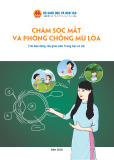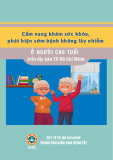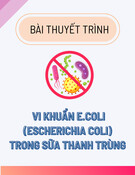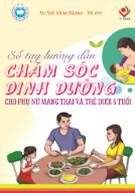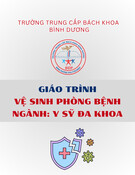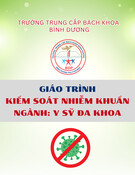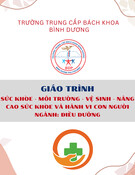
Gardasil Chủng Ngừa Ung Thư
Cổ Tử Cung
FDA Chấp Thuận Cho Phép Dùng Thuốc Chủng Ngừa Ung Thư Cổ
Tử Cung. Thuốc đặt tên là Gardasil. Nguyên tắc là ngừa những vết nhiễm
siêu vi human papillomavirus loại 6, 11, 16 và 18, vào cơ quan sinh dục phụ
nữ. Chích thuốc chủng 3 lần trong 6 tháng. Tuy nhiên nếu phụ nữ đã bị
nhiễm siêu vi trùng H. Papillomavirus trước khi chủng ngừa thì không có
hiệu quả. Ðây là loại thuốc chủng ngừa ung thư cổ tử cung lần đầu tiên. (Xin
đọc thêm về kết quả nghiên cứu thuốc chủng ngừa ung thư cổ tử cung, bằng
tiếng Việt, phần dưới cuối cùng bài này).
FDA Licenses New Vaccine for Prevention of Cervical Cancer
and Other Diseases in Females Caused by Human Papillomavirus
Rapid Approval Marks Major Advancement in Public Health
The Food and Drug Administration (FDA) today announced the
approval of Gardasil, the first vaccine developed to prevent cervical cancer,

precancerous genital lesions and genital warts due to human papillomavirus
(HPV) types 6, 11, 16 and 18. The vaccine is approved for use in females 9-
26 years of age. Gardasil was evaluated and approved in six months under
FDA's priority review process--a process for products with potential to
provide significant health benefits.
"Today is an important day for public health and for women's health,
and for our continued fight against serious life-threatening diseases like
cervical cancer," said Alex Azar, Deputy Secretary, U.S. Department of
Health and Human Services (HHS). "HHS is committed to advancing
critical health measures such as the development of new and promising
vaccines to protect and advance the health of all Americans."
HPV is the most common sexually-transmitted infection in the United
States. The Centers for Disease Control and Prevention estimates that about
6.2 million Americans become infected with genital HPV each year and that
over half of all sexually active men and women become infected at some
time in their lives. On average, there are 9,710 new cases of cervical cancer
and 3,700 deaths attributed to it in the United States each year. Worldwide,
cervical cancer is the second most common cancer in women; and is
estimated to cause over 470,000 new cases and 233,000 deaths each year.

For most women, the body's own defense system will clear the virus
and infected women do not develop related health problems. However, some
HPV types can cause abnormal cells on the lining of the cervix that years
later can turn into cancer. Other HPV types can cause genital warts. The
vaccine is effective against HPV types 16 and 18, which cause
approximately 70 percent of cervical cancers and against HPV types 6 and
11, which cause approximately 90 percent of genital warts.
"This vaccine is a significant advance in the protection of women's
health in that it strikes at the infections that are the root cause of many
cervical cancers," said Andrew C. von Eschenbach, MD, Acting
Commissioner of Food and Drugs. "The development of this vaccine is a
product of extraordinary work by scientists as well as by FDA's review
teams to help facilitate the development of very novel vaccines to address
unmet medical needs. This work has resulted in the approval of a number of
new products recently, including Gardasil, which address significant public
health needs."
Gardasil is a recombinant vaccine (contains no live virus) that is given
as three injections over a six-month period. Immunization with Gardasil is
expected to prevent most cases of cervical cancer due to HPV types included

in the vaccine. However, females are not protected if they have been
infected with that HPV type(s) prior to vaccination, indicating the
importance of immunization before potential exposure to the virus. Also,
Gardasil does not protect against less common HPV types not included in
the vaccine, thus routine and regular pap screening remain critically
important to detect precancerous changes in the cervix to allow treatment
before cervical cancer develops.
"This is the first vaccine licensed specifically to prevent cervical
cancer. Its rapid approval underscores FDA's commitment to help make safe
and effective vaccines available as quickly as possible. Not only have
vaccines dramatically reduced the toll of diseases in infants and children,
like polio and measles, but they are playing an increasing role protecting and
improving the lives of adolescents and adults," said Jesse Goodman, MD,
MPH, Director of FDA's Center for Biologics Evaluation and Research.
Four studies, one in the United States and three multinational, were
conducted in 21,000 women to show how well Gardasil worked in women
between the ages of 16 and 26 by giving them either the vaccine or placebo.
The results showed that in women who had not already been infected,
Gardasil was nearly 100 percent effective in preventing precancerous

cervical lesions, precancerous vaginal and vulvar lesions, and genital warts
caused by infection with the HPV types against which the vaccine is
directed. While the study period was not long enough for cervical cancer to
develop, the prevention of these cervical precancerous lesions is believed
highly likely to result in the prevention of those cancers.
The studies also evaluated whether the vaccine can protect women
already infected with some HPV types included in the vaccine from
developing diseases related to those viruses. The results show that the
vaccine is only effective when given prior to infection.
Two studies were also performed to measure the immune response to
the vaccine among younger females aged 9-15 years. Their immune
response was as good as that found in 16-26 year olds, indicating that the
vaccine should have similar effectiveness when used in the 9-15 year age
group.









![Bài giảng chấn thương ở trẻ em [chuẩn nhất]](https://cdn.tailieu.vn/images/document/thumbnail/2025/20250730/kimphuong1001/135x160/29771753863804.jpg)




